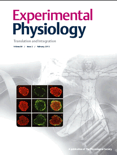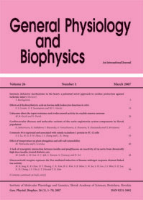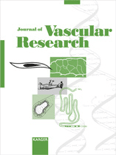
Current Opinion in Physiology
Scope & Guideline
Advancing Insights in the Dynamic World of Physiology
Introduction
Aims and Scopes
- Cellular and Molecular Physiology:
The journal frequently publishes studies exploring the cellular and molecular mechanisms underlying physiological processes, including signaling pathways, gene expression, and cellular interactions. - Cardiovascular Physiology:
A significant portion of the research emphasizes cardiovascular physiology, investigating mechanisms of heart function, vascular biology, and the role of adrenergic receptors in cardiovascular health and disease. - Endothelial Biology:
Research on endothelial cells and their role in various physiological and pathological conditions is a prominent area, including studies on endothelial dysfunction, aging, and their involvement in diseases like hypertension and diabetes. - Exercise Physiology:
The journal highlights the physiological adaptations to exercise, exploring the impact of physical activity on cardiovascular health, muscle function, and overall metabolic regulation. - Non-coding RNAs and Physiology:
Emerging themes include the investigation of non-coding RNAs in regulating physiological processes, emphasizing their roles in cellular signaling and disease mechanisms. - Autophagy and Cell Homeostasis:
Research on autophagy and its implications for cell homeostasis, stress responses, and disease states is a consistent theme, linking basic biology to therapeutic applications.
Trending and Emerging
- Extracellular Vesicles in Disease:
There is a noticeable increase in research on extracellular vesicles, particularly their roles in mediating disease processes such as cardiometabolic diseases and cancer, showcasing their potential as biomarkers and therapeutic targets. - Adrenergic Receptor Signaling:
Recent publications have emphasized the complexity of adrenergic receptor signaling in various physiological contexts, particularly in relation to cardiovascular health, aging, and heart failure. - Endothelial Cell Function and Pathology:
The role of endothelial cells in health and disease is increasingly highlighted, with research focusing on their contributions to conditions such as diabetes, autoimmune diseases, and cardiovascular disorders. - Mechanotransduction and Cellular Responses:
Emerging studies are exploring mechanotransduction pathways, emphasizing how mechanical forces influence cellular behaviors and adaptations, particularly in vascular and muscle physiology. - Non-coding RNAs in Physiology:
The investigation of non-coding RNAs, especially in relation to their regulatory roles in physiological processes, is gaining momentum, indicating a shift towards understanding their functional significance in health and disease.
Declining or Waning
- Microbiome Research:
Although microbiome studies were once a frequent topic, there appears to be a decreasing emphasis on this area, with fewer papers addressing the microbiome's role in physiology and disease. - Neurophysiology:
The exploration of neurophysiological mechanisms, particularly in relation to sensory processing and proprioception, seems to be waning, with fewer articles dedicated to these topics in recent publications. - Gastrointestinal Physiology:
Research focused on gastrointestinal physiology and related disorders has also diminished, with less frequent discussions on topics like gut motility and digestive processes. - Inflammation and Immune Responses:
Although still relevant, the frequency of papers specifically focusing on inflammation and immune responses in various physiological contexts appears to be declining. - Sex Differences in Physiology:
While sex differences remain an important research area, there seems to be a reduced emphasis on this theme, with fewer studies highlighting the impact of sex on physiological processes.
Similar Journals

EXPERIMENTAL PHYSIOLOGY
Exploring the intricate dance of nutrition and physiology.EXPERIMENTAL PHYSIOLOGY, published by WILEY, stands as a vital resource in the fields of Nutrition and Dietetics and Physiology, providing high-quality, peer-reviewed research since its inception in 1990. With an impressive categorization into the Q2 quartile in these domains, the journal emphasizes the integration of experimental and clinical findings, making significant contributions to our understanding of physiological processes and nutritional impacts on health. The journal operates within a competitive landscape, ranked significantly in Scopus, showcasing its relevance to both the medical community and nutritional sciences, as evidenced by its rankings in Nursing, Medicine, and Biochemistry. Though it is not currently open access, the journal remains an indispensable tool for researchers, professionals, and students seeking to deepen their knowledge and stay updated on cutting-edge research. With a publication window extending to 2024, EXPERIMENTAL PHYSIOLOGY continues to influence the academic discourse and promote advancements in its respective fields.

Physiology International
Pioneering Research in Physiology and Sports MedicinePhysiology International is a distinguished journal dedicated to the exploration and advancement of knowledge in the fields of physiology, sports medicine, and rehabilitation. Published by AKADEMIAI KIADO ZRT in Hungary, this open-access journal has been a reliable source of scholarly articles since its inception in 2016, providing valuable insights into both complementary and alternative medicine, as well as traditional medical practices. With an impact factor that situates it in Q2 and Q3 quartiles across related disciplines, including Physical Therapy, Sports Therapy and Rehabilitation and Orthopedics and Sports Medicine, it represents a vital resource for professionals and researchers looking to stay abreast of the latest findings and methodologies. The journal is indexed on Scopus, signifying its credibility and relevance in the medical community. As it continues to develop through 2024, Physiology International invites contributions that challenge existing paradigms and foster innovative approaches to health and wellness, making it an essential platform for advancing the conversation in medical physiology and its applications.

GENERAL PHYSIOLOGY AND BIOPHYSICS
Exploring the Synergy Between Biology and PhysicsGENERAL PHYSIOLOGY AND BIOPHYSICS, published by AEPRESS SRO, is a pivotal journal in the fields of biophysics and physiology, dedicated to advancing knowledge and fostering research in these increasingly vital disciplines. Established in 1983 and set to converge in 2024, the journal provides a platform for scholarly articles that explore the intricate relationships between biological systems and physical principles. Its current category quartiles include Q3 in Biophysics and Q4 in Physiology, demonstrating a growing influence among researchers, with current Scopus ranks reflecting its commitment to quality and relevance. Despite not being an open-access publication, the journal remains a valuable resource for professionals and students aiming to stay informed on the latest discoveries and methodologies. By supporting interdisciplinary research and innovation, GENERAL PHYSIOLOGY AND BIOPHYSICS plays a crucial role in shaping the understanding of complex biological interactions and applications in medicine.

JOURNAL OF MUSCLE RESEARCH AND CELL MOTILITY
Unraveling the Complexities of Muscle Function and MobilityJOURNAL OF MUSCLE RESEARCH AND CELL MOTILITY, published by Springer, is a premier journal dedicated to advancing our understanding of muscle biology and cellular motility. With an ISSN of 0142-4319 and an E-ISSN of 1573-2657, this journal stands out in the fields of biochemistry, cell biology, and physiology, proudly holding a Q2 ranking in each of these categories as per 2023 metrics. Covering significant developments from its inception in 1963 to its anticipated contributions through 2024, this journal serves as a vital platform for researchers and professionals to disseminate their findings and insights globally. Although it does not currently offer open access, its robust academic rigor and relevance are evident from its Scopus rankings, making it a crucial resource for those invested in the biological sciences. With a focus on original research articles, reviews, and methodological advancements, the journal fosters innovative collaborations and discussions within the scientific community, making it an invaluable addition to any researcher’s library.

JOURNAL OF VASCULAR RESEARCH
Fostering collaboration for a healthier tomorrow.Welcome to the JOURNAL OF VASCULAR RESEARCH, a reputable academic journal published by KARGER that has been a cornerstone of vascular research since 1964. With an ISSN of 1018-1172 and an E-ISSN of 1423-0135, this journal plays a vital role in disseminating cutting-edge research in the fields of Cardiology and Cardiovascular Medicine and Physiology. Currently categorized in the Q3 quartile for both disciplines, it ranks as #179 in Cardiology and #131 in Physiology according to Scopus, showcasing its significant contribution to the scientific community. Although the journal operates on a subscription basis, it strives to provide accessible content that informs and inspires researchers, professionals, and students alike. As the journal looks forward to its convergence in 2024, it continues to uphold its mission of advancing knowledge, fostering innovation, and encouraging collaboration within the dynamic realm of vascular research.

Journal of Physiological Sciences
Elevating Physiological Science through Quality ResearchThe Journal of Physiological Sciences, published by BMC, stands as a prominent platform for the advancement of research in the field of physiology. Based in Japan, this open-access journal (ISSN: 1880-6546, E-ISSN: 1880-6562) is committed to disseminating high-quality scientific articles that explore various facets of physiological functions and mechanisms. With a 2023 Scopus ranking placing it within the 41st percentile in the category of Physiology, it is recognized for contributing significant insights that bridge basic and applied physiological research. The journal maintains a Q2 quartile ranking within its category, highlighting its impact within the scientific community. Researchers, professionals, and students are encouraged to engage with cutting-edge studies published from 2006 to 2024, fostering an environment of knowledge accessibility and scientific collaboration. The journal not only serves as a vital resource for those involved in physiological research but also promotes broader understanding and application of physiological principles across various health and science sectors.

JOURNAL OF PHYSIOLOGY AND BIOCHEMISTRY
Unveiling Cellular Secrets for Biomedical InnovationJOURNAL OF PHYSIOLOGY AND BIOCHEMISTRY, published by Springer in the Netherlands, serves as a pivotal platform for disseminating high-quality research within the fields of physiology, biochemistry, and related biomedical sciences. With an impressive impact factor reflected in its categorization as Q2 in Biochemistry and Q1 in Medicine (miscellaneous), this journal fosters a vibrant community of scholars dedicated to advancing knowledge and innovation. The journal’s broad scope encompasses a wide range of topics from cellular mechanisms to systemic physiology, making it relevant for both theoretical and applied sciences. Researchers and practitioners are encouraged to utilize the available Open Access options to reach a wider audience. The journal’s continuous contribution to the scientific dialogue since its inception in 1996 positions it as a key resource for professionals and students alike, facilitating the exploration of cutting-edge topics and collaborative research opportunities.

Comprehensive Physiology
Unlocking the Secrets of Human PhysiologyComprehensive Physiology is a premier journal published by WILEY, dedicated to the profound exploration of physiological science. With an impact factor that underscores its significance within the field, this journal serves as a pivotal resource for researchers, professionals, and students alike, ensuring access to cutting-edge studies and reviews that span various domains of physiology. It stands proudly in the Q1 category across multiple subfields including Medicine (miscellaneous), Physiology, and Medical Physiology, reflecting its outstanding position within the scientific community. Evaluated within prestigious bibliometric ranks, it boasts an impressive Scopus ranking, placing it in the 12th percentile for medical physiology and 23rd percentile in biochemical, genetic, and molecular physiology. As it converges from 2011 to 2024, Comprehensive Physiology continues to foster a platform for innovative discoveries and collaborative exchanges, thereby contributing significantly to the advancement of medical knowledge and understanding of physiological processes.

CELLULAR PHYSIOLOGY AND BIOCHEMISTRY
Pioneering Insights into Cellular ProcessesCellular Physiology and Biochemistry is a premier Open Access journal published by the prestigious Cell Physiol Biochem Press GmbH & Co, dedicated to advancing research in the fields of physiology, biochemistry, and molecular biology. Since its inception in 1987 and transitioning to an Open Access model in 2013, the journal has established itself as a vital resource for the dissemination of high-quality research and reviews, showcasing innovative methodologies and groundbreaking findings in cellular processes. With an impressive ranking in the 2023 Scopus category as Q2 in Physiology and a robust percentile of 61, Cellular Physiology and Biochemistry is committed to fostering academic dialogue among researchers, professionals, and students alike. This journal not only provides unrestricted access to its articles, but also promotes the global sharing of knowledge, which is essential for the advancement of our understanding in these vital scientific areas. The journal's editorial team is dedicated to ensuring the highest standards of academic rigor and relevance, making it an indispensable addition to the libraries of those engaged in the life sciences.

Function
Unraveling biological complexities for transformative healthcare solutions.Function is a pioneering open access academic journal published by Oxford University Press, dedicated to advancing research in the fields of Cancer Research, Cell Biology, Molecular Medicine, and Physiology. Since its inception in 2020, this journal has quickly established itself as a vital resource for researchers and professionals alike, achieving a commendable impact factor in the 2023 rankings, where it stands in the Q2 quartile across multiple categories. Located in the heart of the United Kingdom, Function aims to foster a global exchange of knowledge by providing free and unrestricted access to cutting-edge research, facilitating collaboration and innovation within the scientific community. With a robust focus on emerging discoveries and interdisciplinary approaches, this journal encourages contributions that unravel the complexities of biological functions, paving the way for transformative advancements in healthcare and related sciences. As it converges from 2020 to 2024, Function continues to be an invaluable platform for disseminating research that has the potential to shape the future of medicine and biology.